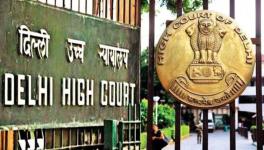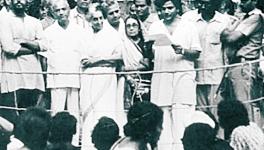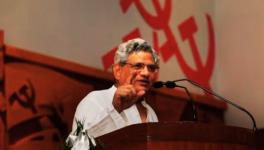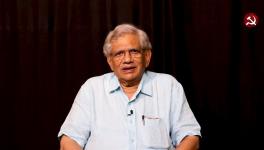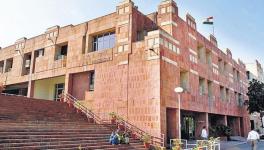A Contempt of Court Ruling Against JNUSU won’t Dissolve their Collective Resistance
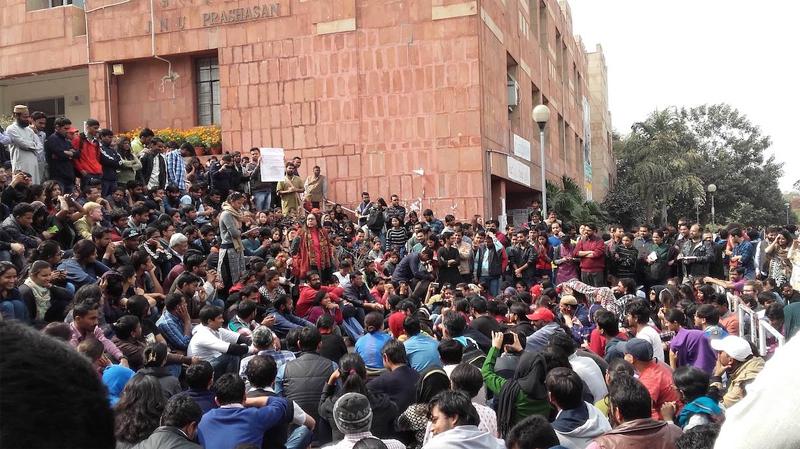
The Delhi High Court held the four office bearers of JNU Students’ Union (JNUSU) guilty of contempt of court on Tuesday, for ‘wilfully disobeying’ their order dated, August 9, 2017. This order disallowed assembly, protest, dharna, march, blockade and use of public address system within a 100-meter radius of the Administrative Block. [Read Tuesday’s Judgement here]
Justice V Kameswar Rao imposed a fine of Rs 2,000 on all four, in response to the contempt petition filed by the University Administration with respect to student protests, ever since January 4, 2018, against compulsory attendance and a circular that indefinitely postponed the Academic Council meeting.
In order to better understand this judgement, the contents of the 2017 order of the High Court need to be illustrated briefly.
The order dated August 9, 2017 states that, besides the 100-meter rule, “The University shall earmark an area where the students can congregate freely to protest.” Subsequently, Sabarmati lawns was notified as this area. It permits the administration to put CCTV cameras “to ensure that the above provisions are carried out.”
This specific feature was protested by students of the University, citing it as one of the many vindictive steps taken by the Administration and the Vice-Chancellor M Jagadesh Kumar, to curb their right to freedom of expression and peaceful assembly. Another move by the VC which heightened the conflict was the placement of “plant posts” near the Admin Block, which the students saw as the occupation of spaces of protest by the authorities.
Also read: Warning Letters to Parents: Another Low by JNU VC, Says Students Union
It goes on to say that “in the event, the aforesaid orders are not complied with, the petitioner would be at liberty to request the police authorities for assistance to maintain law and order in the campus. The police authorities shall act only on the evidence of obstruction to ingress/ egress to the Administrative Building, being provided by the Authorities.”
One can clearly see how hollow these claims, of students having the freedom to protest peacefully made by the administration, as well as the High Court, really are.
In the series of events included in the aforementioned order, it is mentioned that on February 10, 2018, “students came to the Administrative Block, vandalized the public property, broke large number of plant posts,” whose value was estimated at Rs 3 lakhs by representatives of the University.
It looks like the University Administration is more concerned about the cost of flower pots, rather than the cost of destroying one of the best academic and research institutes in the country.
It is mentioned in Tuesday’s judgement that the students repeatedly disobeyed the 100-meter rule and that the protests sometimes became violent and destructive. But neither the judgement nor the counsels appearing for the University, mention the coercive and authoritarian measures resorted to by the Administration and the VC to crush the students’ resistance and their right to peacefully protest and express dissent. The Union office-holders flat-out deny these charges levelled against them, in the affidavit submitted by them in response to the contempt petition.
The students and teachers who have been fighting continuously for a more egalitarian and democratic University have had to encounter many hurdles in the past four years of the Modi regime.
Also read: Former JNU Faculty Members Extend Support to the JNU Struggle
Some of which are: partisan appointments of Professors, Deans and Chairpersons of Schools; sacking of teachers who oppose the moves bulldozed by the administration, without consulting the students, teachers, Academic Council and Executive Council; the dismantling of GSCASH and replacement of the committee by nominees of the administration; the systematic attempts at reducing student intake and especially those from deprived and marginalised sections, by means of seat cuts, fund cuts, stopping of scholarships and fellowships or delay in their disbursement, and the complete destruction of the ‘deprivation points’ system; the arbitrary and irrational rules regarding viva voce examinations for MPhil and PhD candidates that are preventing such students from being examined for the award of their degrees; the changes made in the admission procedure, which have made it more opaque and exclusionary.
Besides all these administrative and academic issues, there are various instances of the ‘Hindutva hand’ of the RSS trying to polarise the campus and fundamentally change it’s democratic, secular and socialist ethos.
Also read: The RSS Design in JNU and the Student Resistance
For instance, the impunity given to ABVP (student wing of RSS) which spreads communal hatred, gives death and rape threats to students and teachers, and unleashes violence throughout the campus; the appointment of new teachers based on their political affiliations to the ruling establishment (RSS-BJP) and their Majoritarian and Hindu-chauvinist cultural worldview (appointing Hindutva ideologues and sympathisers); holding cultural programs by Hindutva organisations and leaders in the Kendriya Vidyalaya Auditorium (which is inside the JNU campus); vilifying left-leaning students and teachers as anti-nationals, terrorist-sympathisers, Naxalites and subjecting them to vicious personal attacks.
Also read: The Withering Away of the University
In response to the Contempt of Court judgement, JNUSU forwarded their Statement to Newsclick,
“Friends JNUSU has been fighting a relentless battle against this authoritarian and anti-student administration. Numerous proctorial enquiries, FIR’s have not deterred our collective resistance against this fascist government and administration.”
After explaining the details of the judgement, in short, the statement goes on to say that,
“We will be exploring our remedies against this order as our resolve to fight the authoritarian administration and the fascist regime will not be deterred at any cost.”
The present office-holders of JNUSU, are Geeta Kumari (President), Simone Zoya Khan (Vice-President) Duggirala Srikrishna (General Secretary) and Shubhanshu Singh (Joint Secretary).
Get the latest reports & analysis with people's perspective on Protests, movements & deep analytical videos, discussions of the current affairs in your Telegram app. Subscribe to NewsClick's Telegram channel & get Real-Time updates on stories, as they get published on our website.









